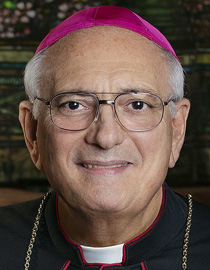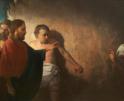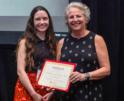
Faith

Social policy formation and lawmaking in our democracy should follow a democratic process in which consultation by our legislators with the groups and individuals who have keen knowledge on migration matters and consultation with ordinary citizens is balanced.

DiMarzio
The politicization of migration policy along party lines has led to a complete breakdown in the legislative process. The bipartisan effort of the past several months seems to have ended, at least at this writing. In one sense, it is better that some of the negative aspects of the Senate bill never saw the light of day. However, it is lamentable that some of the positive solutions suggested in the Senate bill, such as relief for Afghans and increased legal avenues for families, would not become law. It was clear, however, that the negative aspects of the border agreement far outweighed the positive.
There are two major policy goals needed at this time. We need not only better border management, but also the distinctive compassion of past immigration policies, such as family reunification and attention to our labor needs and to immigrant workers.
The border crisis, as some would call it, has its origin in the corruption, poverty and violence in sending countries. The border has been overwhelmed by an influx of asylum-seekers and inadequate resources to handle the volume of asylum requests. The busing of these new migrants to northern cities has complicated the political situation. The migrants have become pawns in a political retribution process.
Social policy formation and lawmaking in our democracy should follow a democratic process in which consultation by our legislators with the groups and individuals who have keen knowledge on migration matters and consultation with ordinary citizens is balanced.
Our legislators cannot exist in isolation, nor can they legislate based on opinion polls. Migration policy is one of the areas in which everyone has an opinion, but not always an informed opinion. In the present chaotic situation, those who have made it a crisis seem to have the upper hand, yet those who propose reasonable solutions to complex problems are ignored.
The recent impeachment of Homeland Security Secretary Alejandro Mayorkas has succeeded in the House of Representatives but most probably will fail in the Senate. This kind of political maneuvering does not help collaborative government.
Mayorkas was only following the law and did not use any discretion that was not his. Unfortunately, the lack of resources has made monitoring and defending the border impossible. Few realize that the processing of immigration benefits like asylum and naturalization must pay for itself. Every petition filed by a migrant for permanent residence, even citizenship and all other matters, are paid for by the recipients with high fees. Congress allocates money only for immigration enforcement which obviously has now proven to be inadequate.
Never in our recent history has migration become such an important issue in a presidential election. Unfortunately, this complicated issue is being manipulated because the basic facts are unknown to the electorate.
The cries of chaos and crisis have been supported by the media with its concentration on a small percentage of criminal acts by recent migrants. News is news, but the story behind the news is more important to tell. Despite the coverage of certain crimes committed by migrants, the truth is that the percentage of criminal acts performed by immigrants is far less than native-born citizens.
Our political system is being strained in trying to find a just solution to a broken immigration system, a system that does not meet the needs of our nation nor that of the migrants who wish to come.
Hopefully, before our November elections the real issues of migration policy can be understood better by an educated electorate. Catholics can educate themselves on the issue by visiting the websites of the U.S. Conference of Catholic Bishops (justiceforimmigrants.org) and the Center for Migration Studies of New York (cmsny.org).
- Bishop Nicholas DiMarzio is retired bishop of the Diocese of Brooklyn, N.Y. He writes the column "Walking With Migrants" for Catholic News Service and The Tablet.
Recent articles in the Faith & Family section
-
Our Lady of DeliveranceJaymie Stuart Wolfe
-
The 'month of the dead' brings its own strange refreshmentBishop Robert Reed
-
Make New Friends, But Keep the OldMaureen Crowley Heil
-
A royal truthScott Hahn
-
St. Cecilia and hope in sacred songRichard Clark


















